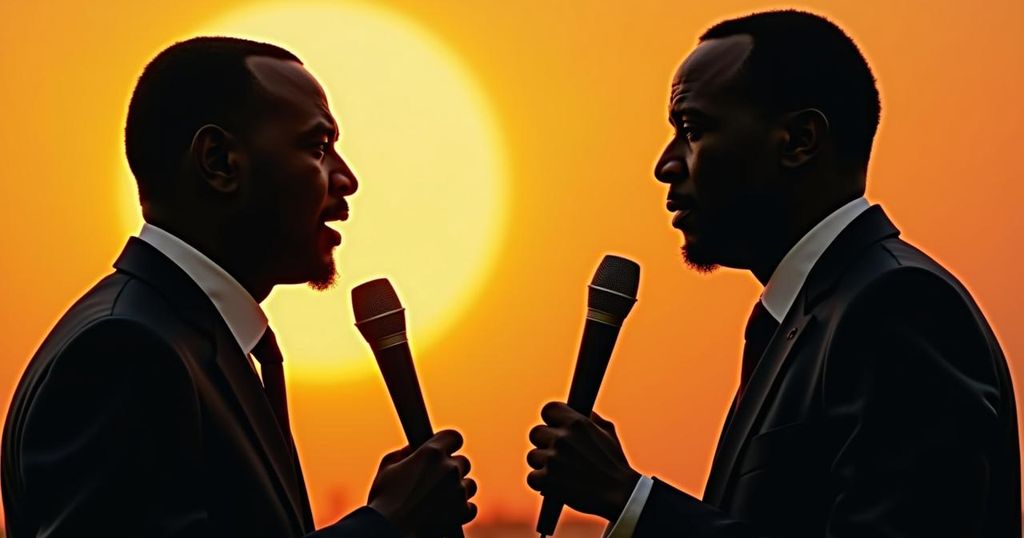Mozambique is on the brink of a transformative election featuring Daniel Chapo of Frelimo and independent Venâncio Mondlane, shaped by public disillusionment with longstanding corruption. As the historical leadership era comes to an end, the electoral process reveals potential disparities with “ghost voters” and reflects a pressing need for economic advancement in the face of widespread poverty. The outcomes may reshape the political landscape of Mozambique significantly.
Mozambique is approaching a pivotal electoral juncture that signals the twilight of leadership entrenched in the historical struggles for independence. For the first time in its political landscape, the Frelimo party is presenting a presidential candidate born post-independence: the dynamic 47-year-old Daniel Chapo, who represents hope for a disillusioned electorate weary from the party’s lengthy rule since 1975. Recent political dynamics indicate that the party’s allure has diminished, with attending campaign members reportedly facing public disdain, as noted by political analyst Charles Mangwiro. As the nation prepares for elections encompassing presidential, parliamentary, and gubernatorial positions on Wednesday, the current President Filipe Nyusi will be stepping down after completing his two terms. His administration’s notoriety is marred by the tuna bond corruption scandal, which instigated substantial economic turmoil. In contrast, Chapo’s emergent candidacy is symbolized as a rejuvenating force, distancing himself from corruption’s grip on Frelimo. One of his campaign’s musical pieces articulates, “Brother Dan is honesty in person… He is the voice of hope we want to embrace… It’s time for change.” Nevertheless, concerns linger regarding Chapo’s ability to persuade the electorate of his commitment to reform, particularly amidst lingering suspicions about Frelimo’s history with corruption. Human rights advocate Mirna Chitsungo remarked on the challenge Chapo faces, stating, “If we have a degraded country, it is because of corruption. He faces the challenge of promising to fight this evil while belonging to a party that, on a large scale, has perpetuated corruption.” Moreover, allegations of election fraud also permeate the political atmosphere, as research from the Centro de Integridade Pública suggests that nearly 900,000 names on the voters’ roll could be fraudulent, pointing to systemic issues within the electoral framework. The situation is compounded by reports that several provinces exhibit a voter registration exceeding the number of eligible adults, raising further doubts about the validity of the electoral process. Nonetheless, both Frelimo and the electoral commission maintain their stance of ensuring free and fair elections. Chapo’s primary competitors include independent contender Venâncio Mondlane and Ossufo Momade, leader of the Renamo party, alongside Lutero Simango from the Democratic Movement of Mozambique (MDM). Mondlane, in particular, is emerging as a favorable candidate among the youth, advocating for national pride with the slogan, “Save Mozambique – this country is ours.” A former banker with ambitions stoked by recent political experiences, Mondlane’s participation complicates the electoral landscape for the established candidates. As the candidates engage voters, Chapo has traveled to South Africa for campaign fundraising, presenting a vision of renewal and comprehensively addressing Mozambican expatriates regarding the importance of their votes. Similarly, Mondlane resonated with voters by acknowledging their grievances and promising solutions to the challenges that prompted emigration. Although the insurgency in the Cabo Delgado province remains an underlying concern, it has not emerged as a central theme in this election cycle. Analysts note the pressing burden on any new administration to create employment opportunities and combat pervasive poverty, affecting over 60% of the population. In conclusion, with parties making their final campaign pushes, the election results remain unpredictable, leaving political experts hesitant to predict a clear victor in an election that is poised to reshape Mozambique’s political trajectory.
The political context of Mozambique’s upcoming election is characterized by a significant generational shift, as the nation transitions away from leaders whose influence was forged during the liberation struggle against Portuguese colonialism. This election will be particularly historical due to the candidacy of Daniel Chapo, a representative of a younger generation, indicating a potential change in the political landscape. Furthermore, the enduring challenges faced by the nation, including corruption scandals that have plagued Frelimo, exacerbating economic crises, and widespread poverty, underscore the struggle for reform in a country that has historically faced political unrest and mismanagement since gaining independence in 1975.
In summary, Mozambique’s election presents a critical turning point for the nation as it navigates the complexities of transitioning leadership amid rampant skepticism towards the ruling Frelimo party and its legacy of corruption. The emergence of candidates like Daniel Chapo and Venâncio Mondlane reflects a changing political dynamic, with the electorate poised to demand accountability and transformative change. The upcoming election serves as both an opportunity and a challenge for the electorate, exemplifying their desire for substantive reforms and improved living conditions.
Original Source: www.bbc.com







